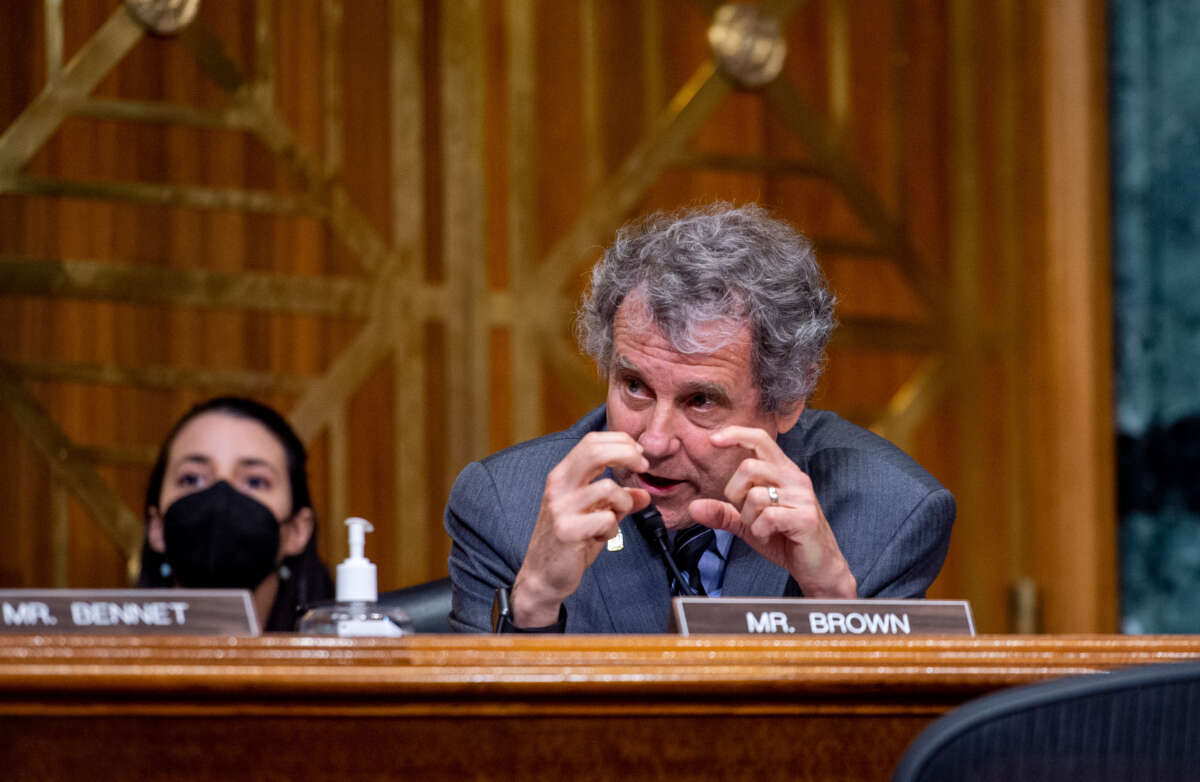With the backing of President Joe Biden, Democrats in the Senate are moving to quadruple the corporate stock buyback tax following a record year for stock buybacks, which topped $1 trillion among S&P 500 companies for the first time in 2022.
On Wednesday, Senators Sherrod Brown (D-Ohio) and Ron Wyden (D-Oregon) introduced a bill that would increase the stock buyback tax from 1 percent, as passed in last year’s Inflation Reduction Act (IRA), to 4 percent. The lawmakers say that it would help cut down on tax avoidance for corporations and wealthy shareholders after the practice of stock buybacks exploded in popularity due to Republicans’ tax code overhaul in 2017.
“It is not lost on the American people that corporate profits have climbed right along with the prices that families have been paying for groceries, rent, gas and other basics over the last few years,” Wyden said in a statement about the bill. “To see big multinational corporations announcing record stock buybacks benefitting their executives and wealthy shareholders at a time when so many families are feeling squeezed by inflation is simply offensive.”
The bill is timely: Despite the new tax on buybacks, the practice of buybacks has reached a fever pitch amid high inflation rates largely driven by corporations jacking up prices in order to boost profits, which have broken records in recent months. Corporations announced stock buyback plans totalling $1.22 trillion in 2022, and companies are on track to beat that record again in 2023.
Stock buybacks have become extremely common in recent years as companies seek to line their shareholders’ and executives’ pockets with the excess profits they’ve made from price increases. They are eclipsing dividends as an option to enrich shareholders as they allow shareholders to avoid paying taxes; while dividends are treated as income for tax purposes, gains from buybacks aren’t taxed until a shareholder sells the stock.
The Donald Trump-backed corporate tax cuts massively opened the door to stock buybacks in 2017 by freeing up billions of dollars that corporations otherwise would have had to pay taxes on to use for buybacks. Companies have taken full advantage of this, and an analysis by the Institute on Taxation and Economic Policy published Monday found that, in the four years following the tax overhaul, S&P 500 companies collectively spent more on stock buybacks than they did on capital expenses like buildings, equipment and software.
The current explosion in stock buybacks has been a long time in the making, however, going even further back than the Trump tax cuts. Stock buybacks were all but illegal until the 1980s, viewed as a way to manipulate and inflate stock prices. But in 1982, President Ronald Reagan’s administration carved out a “safe harbor” for companies to be able to engage in stock buybacks, allowing corporations to spend significant portions of their profits on buybacks. A report in 2018 by the Roosevelt Institute found that, over the previous 15 years, firms spent about 94 percent of their profits on buybacks and dividends.
Biden has called for the stock buyback tax to be increased, and in his State of the Union address last week, the president said that quadrupling the tax will be necessary to get corporations to give back to the public, from whom they leeched those profits.
“Corporations ought to do the right thing. That’s why I propose we quadruple the tax on corporate stock buybacks and encourage long-term investments,” Biden said. He highlighted the profits of the fossil fuel industry, which raked in a record $200 billion in profits last year as gas prices soared.
We’re not backing down in the face of Trump’s threats.
As Donald Trump is inaugurated a second time, independent media organizations are faced with urgent mandates: Tell the truth more loudly than ever before. Do that work even as our standard modes of distribution (such as social media platforms) are being manipulated and curtailed by forces of fascist repression and ruthless capitalism. Do that work even as journalism and journalists face targeted attacks, including from the government itself. And do that work in community, never forgetting that we’re not shouting into a faceless void – we’re reaching out to real people amid a life-threatening political climate.
Our task is formidable, and it requires us to ground ourselves in our principles, remind ourselves of our utility, dig in and commit.
As a dizzying number of corporate news organizations – either through need or greed – rush to implement new ways to further monetize their content, and others acquiesce to Trump’s wishes, now is a time for movement media-makers to double down on community-first models.
At Truthout, we are reaffirming our commitments on this front: We won’t run ads or have a paywall because we believe that everyone should have access to information, and that access should exist without barriers and free of distractions from craven corporate interests. We recognize the implications for democracy when information-seekers click a link only to find the article trapped behind a paywall or buried on a page with dozens of invasive ads. The laws of capitalism dictate an unending increase in monetization, and much of the media simply follows those laws. Truthout and many of our peers are dedicating ourselves to following other paths – a commitment which feels vital in a moment when corporations are evermore overtly embedded in government.
Over 80 percent of Truthout‘s funding comes from small individual donations from our community of readers, and the remaining 20 percent comes from a handful of social justice-oriented foundations. Over a third of our total budget is supported by recurring monthly donors, many of whom give because they want to help us keep Truthout barrier-free for everyone.
You can help by giving today. Whether you can make a small monthly donation or a larger gift, Truthout only works with your support.
